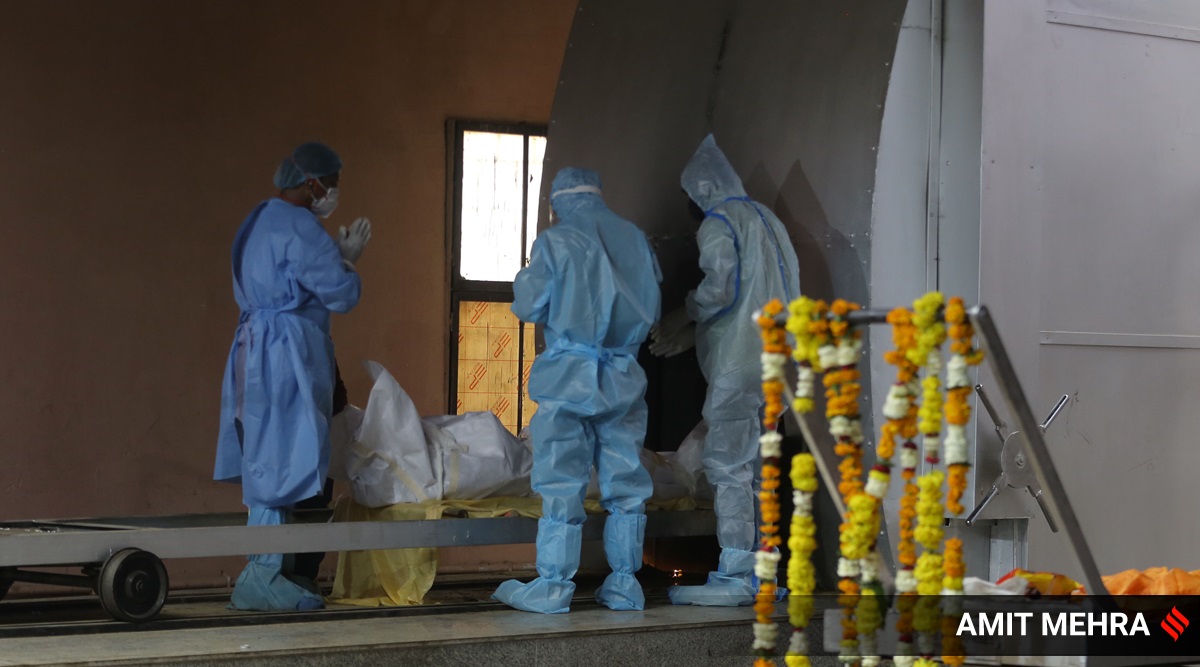 A person who died of Covid-19 being taken for cremation at Nigam Bodh Crematorium in New Delhi. (Express Photo: Amit Mehra)
A person who died of Covid-19 being taken for cremation at Nigam Bodh Crematorium in New Delhi. (Express Photo: Amit Mehra) Observing that the National Disaster Management Authority (NDMA) had “failed to perform its duty”, the Supreme Court Wednesday directed it to recommend guidelines within six weeks for ex gratia to family members of those who lost their lives during the Covid-19 pandemic.
“It is the statutory duty cast upon the National Authority to recommend guidelines for the minimum standards of relief to be provided to persons affected by disaster, which shall include the reliefs,” the bench of Justices Ashok Bhushan and MR Shah said in its ruling, relying on Section 12 of the Disaster Management Act, 2005.
The order came on a batch of writ petitions seeking directions to the Central and state governments to provide ex gratia compensation of Rs 4 lakh under the Disaster Management Act (DMA) to the family of each who died due to Covid-19.
While mandating guidelines to provide ex gratia, the bench declined to specify the amount of compensation to be provided.
“No State or country has unlimited resources. That is why it only announces the financial reliefs/packages to the extent it is possible. When the Government forms its policy, it is based on a number of circumstances, on facts, law including constraint-based governmental resources,” it said.
The bench rejected the Centre’s argument that the term “shall” in Section 12 of the DMA be read as “may” so that it would not be mandatory for the government to frame guidelines for compensation under the Act.
“The language used in the provision is very plain and unambiguous,” the bench said.
Section 12 of the Act states: The National Authority shall recommend guidelines for the minimum standards of relief to be provided to persons affected by disaster, which shall include, — (i) the minimum requirements to be provided in the relief camps in relation to shelter, food, drinking water, medical cover and sanitation; (ii) the special provisions to be made for widows and orphans; (iii) ex gratia assistance on account of loss of life as also assistance on account of damage to houses and for restoration of means of livelihood; (iv) such other relief as may be necessary.
What this can lead to
While the ruling reads the provisions of the Act to the letter and mandates the NDMA to frame compensation guidelines, it is likely to set a precedent. It also raises questions on the rationale of the government’s invocation of the Act to tackle the pandemic, a disaster distinct from natural disasters for which the Act was envisaged.
In March 2020, the Union Home Ministry declared Covid-19 a “Notified Disaster” under the Disaster Management Act, which allows petitioners to invoke Section 12 of the statute to seek compensation.
The court refused to accept the government’s argument that mandating ex gratia for those who died of Covid-19 is beyond the fiscal affordability of states and the Centre when the pandemic has also been an economic disruption.
Solicitor General Tushar Mehta had argued that a conscious decision has been taken by the Finance Commission and/or Union of India to make provision to use the fund from the National and State Disaster Relief Funds for the purpose of creating infrastructure, hospitals, testing, vaccination, ICU facilities and providing food to migrant labourers and those below poverty line instead of paying ex-gratia assistance.
The government also argued that the DMA is not envisaged to provide compensation for the Covid-19 pandemic which has a lasting or long term impact, unlike other natural disasters like earthquakes or floods.
The bench, however, held that the government’s arguments “cannot be accepted for the simple reason that every disaster as defined under Section 2(d) of the Act is a disaster and once it is declared as a “notified disaster”/national disaster/disaster, Section 12 of DMA 2005 shall be applicable and is mandatorily to be complied with, with respect to any disaster, within the meaning of Section 2 (d) of DMA 2005.”
Noting that while several states had varying schemes for providing compensation, the bench said that uniform guidelines at the Central level would be appropriate.
“To avoid any heart-burning and discriminatory treatment, it would be appropriate for the National Authority to recommend uniform guidelines while providing for the minimum standards of relief in the form of ex gratia assistance on account of loss of life, as mandated under Section 12 of the Act,” it said.
- The Indian Express website has been rated GREEN for its credibility and trustworthiness by Newsguard, a global service that rates news sources for their journalistic standards.

